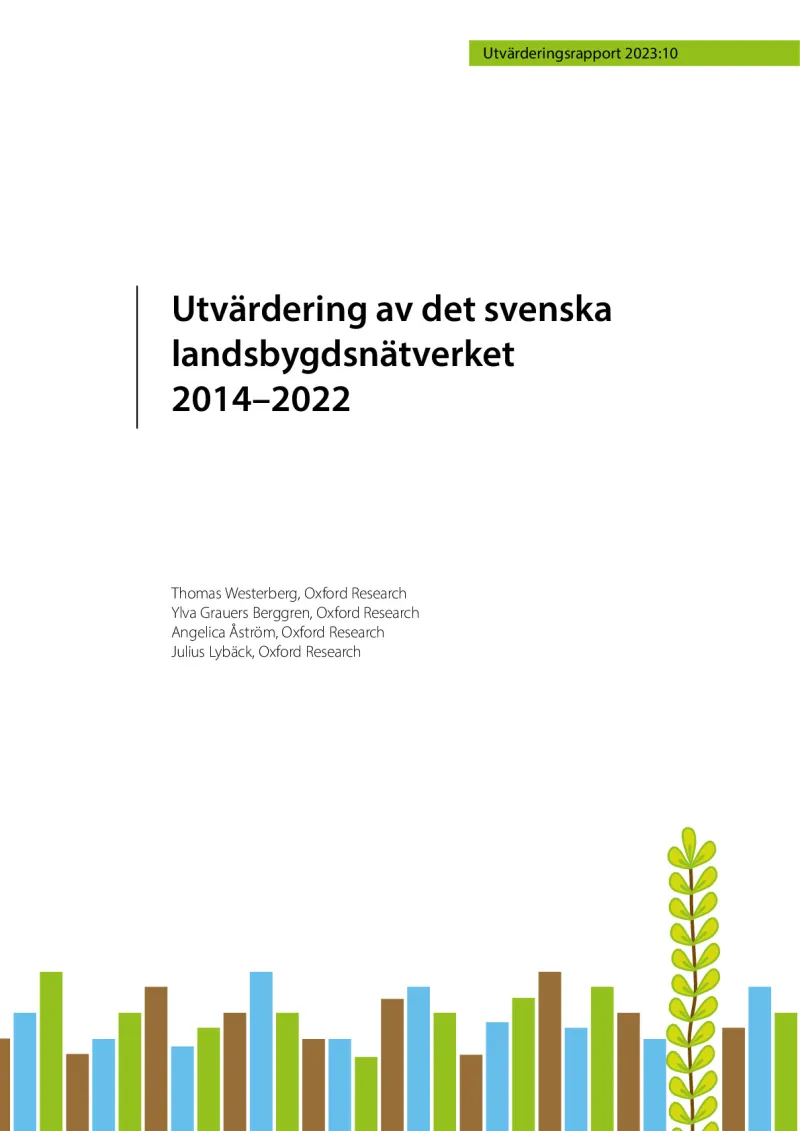Evaluation of the 2014-2022 Swedish Rural Network
The purpose of the evaluation is to analyse the Swedish Rural Network's work on the 2014-2022 Rural Development Programme.
- Sweden
- 2014-2022
- Socio-economic impacts


The Swedish Rural Network was established in 2007 following a decision by the European Commission that all Member States receiving EU funding for rural development should have a national forum for cooperation. The network's aim was to bring together all stakeholders representing important interests in rural areas in Sweden.
The purpose of the evaluation is to analyse the Rural Network’s work on the 2014-2022 Rural Development Programme (RDP).
The overall objectives of the Rural Network are:
- Increase stakeholder participation in the implementation of rural development and maritime and fisheries development.
- Improve the quality of the RDP, the Maritime and Fisheries Programme and the Regional and Social Fund programme for community-led local development.
- Inform wider public and potential beneficiaries about rural development policy and maritime and fisheries policy.
- Promoting innovation in agriculture, food production and forestry as well as in rural areas.
To fulfil the purpose, the evaluation has five overarching questions: 1) To what extent does the Rural Network live up to its overall objectives? 2) To what extent do the objectives, organisation and activities of the Rural Network respond to the needs of its members? 3) To what extent is the organisation and operation of the Rural Network well-functioning, and does the network maintain the expected efficiency? 4) To what extent is the Rural Network coherent with other programmes, actions or strategies in neighbouring areas? 5) To what extent does the Rural Network complement other networks, programmes or actions by delivering results that could not have been achieved by other means?
The study follows a theory-based evaluation, which means that it is based on a theory of how the business is expected to work, a so-called theory of change or intervention logic. The data collection has been carried out in three stages and with a combination of methods. The evaluation started with an analysis of documents and quantitative data, such as studies of policy documents, member surveys, progress reports, follow-up of activities and surveys carried out by the Rural Network during the programming period. People from the network’s office and representatives of the network’s member organisations were interviewed. A total of 26 interviews were conducted. Finally, four target group seminars were held with steering group representatives, members and the chairperson of the Rural Network’s working groups.
The evaluation report concludes that stakeholders participate more actively in the network, but they have different interests and commitments. In general, the Rural Network is seen as a neutral platform for collaboration, exchange of experience and joint ownership. At the same time, there seems to be a division into 'insider members' and 'outsider members' in such a way that active members leave a bigger impression on the network, while the interests and needs of passive members are captured less often.
The Rural Network has contributed to improving the rural programme during the programming period by strengthening leadership activities, broadening dialogue areas, and increasing knowledge of needs and opportunities for collaboration. However, the network’s agricultural orientation may result in a less ambitious rural development agenda.
Meanwhile, the results show that the Rural Network has had difficulties reaching the wider public rather than members of the network.
The Rural Network promotes innovation, mainly by being an arena for knowledge sharing and support for actors seeking innovation support. However, there are geographical and thematic differences among beneficiaries. For example, most approved innovation projects are found in southern Sweden where they are mostly agriculture-related.
The results show that the activities of the Rural Network contribute to increased knowledge among its members by providing an arena for exchange of experience, lessons learned and new ideas, which is also described as its main added value. However, the Rural Network struggles to move from individual to organisational learning, i.e. to ensure that knowledge transfer not only stays with an individual member representative but is passed on to other colleagues in the organisation.
Author(s)
Thomas Westerberg, Ylva Grauers Berggren, Angelica Åström, Julius Lybäck (Oxford Research)